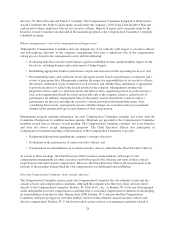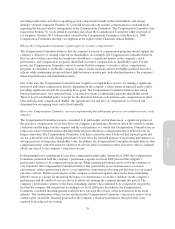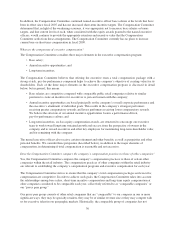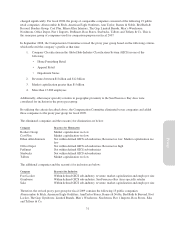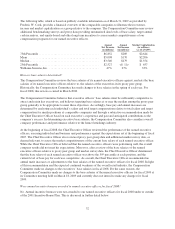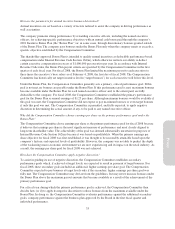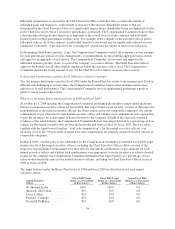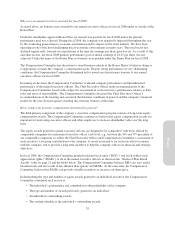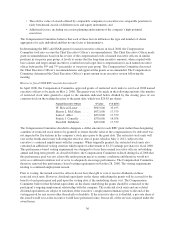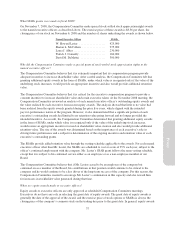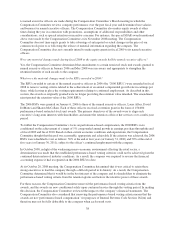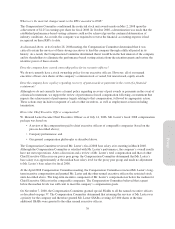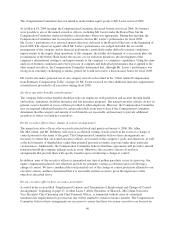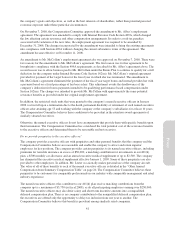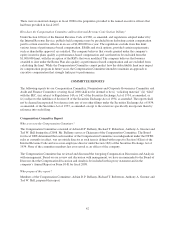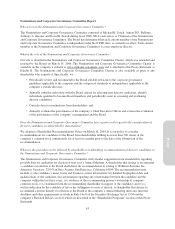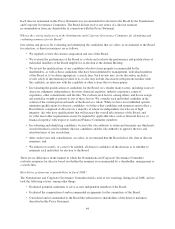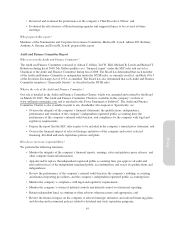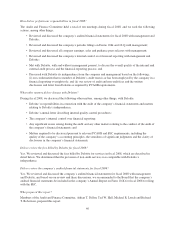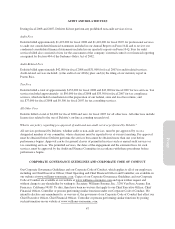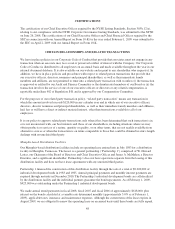Pottery Barn 2008 Annual Report Download - page 136
Download and view the complete annual report
Please find page 136 of the 2008 Pottery Barn annual report below. You can navigate through the pages in the report by either clicking on the pages listed below, or by using the keyword search tool below to find specific information within the annual report.to named executive officers are made during the Compensation Committee’s March meeting in which the
Compensation Committee reviews company performance over the past fiscal year and determines base salaries
and bonuses for named executive officers. The Compensation Committee also makes equity awards at other
times during the year in connection with promotions, assumptions of additional responsibilities and other
considerations, such as special retention or incentive concerns. For instance, the special SSAR awards mentioned
above were made by the Compensation Committee at its November 2008 meeting. The Compensation
Committee does not time equity grants to take advantage of anticipated or actual changes in the price of our
common stock prior to or following the release of material information regarding the company. The
Compensation Committee does not currently intend to make equity grants in fiscal 2009 to its named executive
officers.
Were any material changes made during fiscal 2008 to the equity awards held by named executive officers?
Yes, the Compensation Committee determined that amendments to certain restricted stock unit awards granted to
named executive officers in January 2006 and May 2008 were necessary and appropriate to strengthen the
retention benefits of such awards to the company.
What were the material changes made to the RSUs awarded in 2006?
The RSUs awarded to certain of the named executive officers in 2006 (the “2006 RSUs”) were amended in fiscal
2008 to remove vesting criteria related to the achievement of an annual compounded growth rate in earnings per
share, while leaving in place the vesting requirements relating to continued employment. As described in this
section, the awards as originally granted were no longer providing the retention value intended. The amendment
reinvigorated the retention value of the 2006 RSUs.
The 2006 RSUs were granted on January 6, 2006 to three of the named executive officers, Laura Alber, David
DeMattei and Sharon McCollam. Each of these officers received a retention grant in the form of 150,000
performance-based restricted stock unit awards. The primary objectives of the awards were to align each
executive’s long-term interests with shareholders and ensure the retention of his or her services over a multi-year
period.
To further the Compensation Committee’s focus on performance-based compensation, the 2006 RSUs were
conditioned on the achievement of a target of 5% compounded annual growth in earnings per share through the end
of fiscal 2009 and fiscal 2010. Based on then-current economic conditions and expectations, the Compensation
Committee thought that this goal was reasonable, appropriate and achievable. If the criterion was achieved, the 2006
RSUs were scheduled to vest as follows: 50% at the end of four years (or January 31, 2010) and 50% at the end of
five years (or January 30, 2011), subject to the officer’s continued employment with the company.
In October 2008, in light of the weakening macro-economic environment affecting the retail sector, a
determination was made that the established performance-based vesting criterion could not be achieved given the
continued deterioration of industry conditions. As a result, the company was required to reverse the financial
accounting expense it had recognized on the 2006 RSUs to date.
At its October 28, 2008 meeting, the Compensation Committee determined that it was critical to retain these
strong executives to lead the company through a difficult period in its history. As a result, the Compensation
Committee determined that it would be in the best interest of the company and its shareholders to eliminate the
performance-based vesting criteria from the retention grants and restore the retentive power of these awards.
For these reasons, the Compensation Committee removed the performance-based vesting criteria from the
awards, and the awards are now conditioned solely upon continued service through the vesting period. In making
this decision, the Compensation Committee reviewed the impact to the company’s financial statements. The
Compensation Committee also considered that removing the performance-based vesting criteria means that the
awards are not “performance-based compensation” for purposes of Internal Revenue Code Section 162(m) and
therefore may not be fully deductible to the company when each award vests.
38


